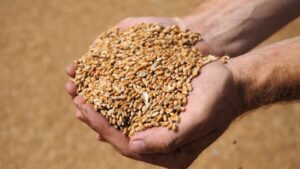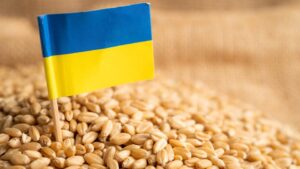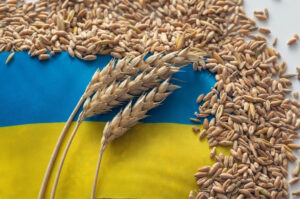
The Slovak government has decided to extend the ban on imports of wheat, corn, rapeseed and sunflower seeds from Ukraine until the end of the year, Prime Minister Ludovit Odor said.
“The European Commission did not extend the ban on imports of four commodities from Ukraine, including wheat, after September 15, so the government decided to ban their imports at the national level. And this is until the end of the year and for the same four products, i.e. wheat, corn, rapeseed and sunflower seeds. We must prevent excessive pressure on the Slovak market to remain fair to domestic farmers,” Odor said, according to Aktuality.
According to him, this step of the government is also a reaction to a similar approach of Poland and Hungary. Odor emphasized that the Slovak government will continue to work intensively with the European Commission and EU member states to find a pan-European and systemic solution while the national ban on imports of these four products is in effect. He stated the government’s readiness to lift the ban in this case.
The Ministry of Agriculture and Rural Development of Slovakia added that this decision is related to the protection of the domestic market and is a logical response to the practice of neighboring countries that adopt unilateral import bans.
“The ban does not apply to the transportation of goods through our territory, which expresses our solidarity with Ukraine and the placement of its goods in target markets,” the ministry added.

On Sunday, the European Commission called on Poland, Hungary and Slovakia to be constructive after they unilaterally announced that they would extend the ban on grain imports from Ukraine despite the Commission’s decision to end the ban, Reuters reports, citing a European Commission spokesman.
“We are aware of statements by some member states regarding unilateral measures. It is now important that all countries work in a spirit of compromise and engage in constructive cooperation,” the Commission spokeswoman said.
According to her, Brussels is now focused on “putting in place and making work the new system that has just been announced.”
In particular, Reuters reports that a meeting with representatives of all interested EU countries will be held on Monday to discuss the issue of Ukrainian grain imports in more detail.
The news agency notes that Ukraine was one of the world’s leading grain exporters before Russia’s invasion in 2022 reduced its ability to deliver agricultural products to world markets through Black Sea ports. Since then, Ukrainian farmers have relied on grain exports through neighboring countries.
However, the influx of grains and oilseeds to neighboring countries has affected the incomes of local farmers and led governments to ban imports of agricultural products from Ukraine.
As reported, the ban on the export of wheat, barley, rapeseed and sunflower seeds from Ukraine to Poland, Hungary, Slovakia, Romania and Bulgaria, introduced on May 2 for the period until June 5, was extended until September 15.
On Friday, September 15, the EU allowed the ban to be lifted after Ukraine promised to take measures to tighten export controls to neighboring countries.

Hungary has decided to extend the ban on imports of 24 types of agricultural products from Ukraine that are under its national jurisdiction, Hungarian Agriculture Minister Istvan Nagy said on his Facebook page on Friday.
The Minister argued that this was to protect the interests of Hungarian farmers.
As reported, the European Commission did not extend the ban on exports of certain agricultural products from Ukraine to five countries after September 15, but Poland has also announced its unilateral extension.

Following the meeting of the coordination platform on Ukrainian grain exports, no decision was made on whether or not to extend the current temporary ban on grain imports to Poland, Hungary, Romania, Slovakia and Bulgaria, which expires on September 15.
This was reported to Interfax-Ukraine on Wednesday after the 9th meeting of the joint coordination platform, chaired by the head of the cabinet of the Vice President of the European Commission Valdis Dombrovskis, Mr. Hager.
According to her, the first part of the meeting was attended by representatives of five member states, Ukraine, the Republic of Moldova and the Commission. “The Commission presented the latest forecasts of the market situation in terms of harvest, trade and prices. Countries were invited to share the latest information. The platform also discussed how to increase storage capacity and reduce border crossing time. Finally, they exchanged views on short-term actions to facilitate trade flows and on ways to support transport,” the EC representative said about the content of the first part of the platform meeting.
According to Garcia, the second part of the meeting, which was attended by representatives of Estonia, Latvia, Lithuania, Greece, Italy and Croatia, was devoted to alternative routes.
“In the context of this meeting, the Commission informed that no decision has yet been made on preventive measures, the phased abolition of which is scheduled for September 15, 2023. In any case, the Platform will continue to meet regularly and monitor grain imports from Ukraine,” the European Commission representative stated.
As you know, in May 2022, the EU decided to temporarily suspend import duties, quotas and trade remedies on Ukrainian exports to the European Union – known as autonomous trade measures – to help alleviate the difficulties faced by Ukrainian producers and exporters after the Russian invasion. At the same time, following logistical problems in Bulgaria, Hungary, Poland, Romania, and Slovakia caused by imports of wheat, corn, rapeseed, and sunflower seeds originating in Ukraine, exceptional and preventive measures on their imports came into force on May 2, 2023, and were extended on June 5.

“DTEK Energo plans to import about 210,000 tons of coal from Poland for more reliable passage of the autumn-winter period by thermal generation, the energy holding company said in a press release on Wednesday.
Under the fuel import contract, an agreement has been reached on the supply of thermal coal throughout the heating season, starting from September 2023 and until March 2024.
As the company noted, the first coal shipments are expected as early as this week.
“In the conditions of war, unpredictable actions of the enemy and the increased load that the company’s thermal power plants have been carrying in recent months, additional volumes of imported fuel will allow to “back up” and provide an additional margin of safety for a more stable passage of the nearest heating season by thermal generation,” said Ildar Saleev, CEO of DTEK Energo, quoted in the press release.
As reported, DTEK Energy’s thermal power plants have increased their electricity output by 28% over the last four months compared to the same period last year. In turn, in August, when consumption was at record highs for the summer due to the heat wave, power engineers generated 35% more electricity than in August 2022.
In just eight months of this year, DTEK Energy’s thermal power plants supplied almost 9.9 bln kWh of electricity, which is equivalent to the average consumption of about 3.3 mln households during the year.

In January-August of this year, Ukrainian enterprises reduced imports of lead and lead products by 67.9% to $722 thousand ($9 thousand), imports of tin and tin products by 33.8% to $1.633 million ($208 thousand), but increased imports of zinc and zinc products by 10.1% to $28.775 million ($3.934 million).
Exports of aluminum and aluminum products in January-August this year decreased by 4.8% compared to the same period last year to $63.289 million ($8.201 million in August), lead and lead products increased by 13.6% to $9.866 million ($0.876 million), nickel and nickel products amounted to $201 thousand ($76 thousand), while in 8 months. 2022 it was $1.339 million.
Imports of tin and tin products fell by 33.5% to $3.312 million, while imports of zinc and zinc products decreased by 58.7% to $38.690 million.